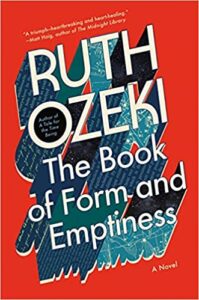 Have YOU experienced the phenomenon of psychometry? This is the ability to sense the ownership, relevance, and history of an object by TOUCH. If so, I want to hear from you. I want to know WHAT object in particular spoke to you, how, when, where, and why. Did you “receive” images, sounds, smells, emotions? What pictures did you see? What events did you sense? Did you rely on what you KNEW about the object, or did you “let” the object tell you ITS story?
Have YOU experienced the phenomenon of psychometry? This is the ability to sense the ownership, relevance, and history of an object by TOUCH. If so, I want to hear from you. I want to know WHAT object in particular spoke to you, how, when, where, and why. Did you “receive” images, sounds, smells, emotions? What pictures did you see? What events did you sense? Did you rely on what you KNEW about the object, or did you “let” the object tell you ITS story?
I felt thrilled to read of the voices of objects as protagonist(s) in Ruth Ozeki’s new novel The Book of Form and Emptiness. The book tells the story of a young boy, recently bereaved, who hears the voices of inanimate things. He hears the voice of the very book in which he is a character as the book narrates his story.
THINGS speak to the boy.
 In fact when visiting libraries, “the words on the pages give the voices in his head something to think about.”
In fact when visiting libraries, “the words on the pages give the voices in his head something to think about.”
I’m happy to report this line of thought is developing across traditional academic fields in a philosophy called “The New Materialism.” This enlightening (no pun intended) yet dense philosophy suggests a much closer relationship of meaning between an object (non-human) and a subject (living beings). The traditional way of thinking about our material world says, as living subjects “act” and have “will;” we cause events, objects do NOT. But, the new philosophy asks, what if the definition of “object” included systems such as storm patterns, bio-contagion, political movements, and collections from past generations? Maybe matter isn’t inert but alive itself. As scholar Jane Bennett (2010) said, “Matter is vibrant.”
 Think of objects we own as a network of human and non-human ‘actors’ upon events, decisions, history, choice…. What does a THING/OBJECT mean as differentiated from us? Are we co- creators?
Think of objects we own as a network of human and non-human ‘actors’ upon events, decisions, history, choice…. What does a THING/OBJECT mean as differentiated from us? Are we co- creators?
Perhaps we can stretch the new definition to include an actual physical dimension. Those who study holography suggest the past exists in all matter on a sub-atomic level. Psychologists who study people who claim to be clairvoyant say that objects, for those that may be telepathic, are channels for a focus that reveals an object’s ownership, related events, and history.
Where does that come from?
There’s more to your “belongings” that meets your eye, or the inside of your dumpster, especially these days. We’ve locked ourselves in an object-laden world for twenty months. The remedy for our boredom may be a longing to get out and shop again. Lines of shoppers at thrift stores intrigue me. The same thrift store perhaps received a “load” from one of those very shopper a week before.
 To emphasize that point, listen to all the “news” about objects involved in the current “supply chain catastrophe.” Do the objects care? Are goods traumatized? (Wait…maybe my new refrigerator feels lonely, floating in the waters off Long Beach.) In that very phrase, “the supply chain catastrophe” we empower OBJECTS with emotion. Supplies are not catastrophizing. We humans are! Word “chains” such as this may offer us a new clarity around the “stuff” of life, a life with perhaps new priorities, in which we have enough space to live and enough connection to our futures and pasts as co-inhabitants of this material world. I’m not one of those de-clutters who want everything GONE. An object discarded has no voice…but it is time to look at objects floating off the ports as a human-object lesson.
To emphasize that point, listen to all the “news” about objects involved in the current “supply chain catastrophe.” Do the objects care? Are goods traumatized? (Wait…maybe my new refrigerator feels lonely, floating in the waters off Long Beach.) In that very phrase, “the supply chain catastrophe” we empower OBJECTS with emotion. Supplies are not catastrophizing. We humans are! Word “chains” such as this may offer us a new clarity around the “stuff” of life, a life with perhaps new priorities, in which we have enough space to live and enough connection to our futures and pasts as co-inhabitants of this material world. I’m not one of those de-clutters who want everything GONE. An object discarded has no voice…but it is time to look at objects floating off the ports as a human-object lesson.
You’ll enjoy The Book of Form and Emptiness, in which a character says, “This book is not just about your belongings. It’s about living a life where you truly belong.”
Write me if you’ve had the psychometric experience, as I have, of an object “speaking” to you. Help me reflect on the meaning of “be-long-ing,” and, conversely, the (anthropomorphized) meaning of “objects locked in a supply chain crisis.” In those two polarities much information about our material world now lies.